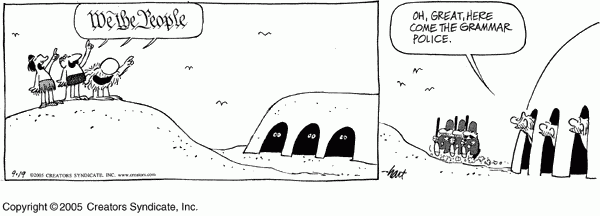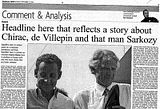This article on semicolons in the Financial Times is a truly delightful read. It discusses the reasons behind Americans' distaste for the mark, whereas the Brits can't get enough.
"You're kidding," said Ann Keatings, an applied linguist, as she absorbed the news I had brought from the US, where I have lived for the past 12 years: Americans see the semicolon as punctuation's axis of evil. Or at least many of them do. "But I like semicolons," she protested, "they allow a writer to go further." Trevor McGuinness, a business manager, was equally incredulous. "Hazlitt," he said, smacking the table indignantly, "look at Hazlitt!" Had midnight been closer and the bottle emptier, we might have taken him literally; but the point still floated within the grasp of sober minds: if so great a prose stylist as William Hazlitt had embraced the semicolon, then surely we could too?
I'm a fan of the semicolon. But I don't like to use them before conjunctions, and I use them only between two independent clauses. But even with these restrictions, I like them more most Americans, I suspect.
What do America's high-thinking literary types say? Trevor Butterworth, the article's author, quotes several.
There's
Bill Walsh, quoted from "Lapsing": "The semicolon is an ugly bastard, and I try to avoid it."
There's "postmodern writer" Donald Barthelme, whom I'd never heard of before, who says: "Let me be plain: the semicolon is ugly, ugly as a tick on a dog's belly, I pinch them out of my prose." Of course, the way that sentence is punctuated, what do I care about his thoughts on the semicolon, anyway?
There's Louis Menand, who made
his first appearance in A Capital Idea when he shat all over Lynne Truss' "Eats, Shoots & Leaves": "There's an animus against the semicolon because it adds nuance," he says. "It makes the reader think that the relationship between two independent clauses is more complex."
Butterworth takes a thoughtful look at why American journalism cuts out the commas.
"I use semicolons and I never really enforced a hard-and-fast rule," [Michael] Kinsley responded recently by e-mail from the West Coast, where he has been running The Los Angeles Times' opinion pages for the past year [woops, not anymore]. "But if abuse is going to be common," he continued, "it's simpler and safer to have a flat-out rule. It's like drug regulation. Drugs are banned sometimes because a minority of users will have negative side effects, or because taking them correctly is complicated, although many people could get it right and would find them helpful. Actually, I'm opposed to that kind of thinking re drugs, but I am OK with it regarding punctuation. Punctuation can't save your life." So how then does the semicolon endanger writing? "The most common abuse of the semicolon, at least in journalism," explains Kinsley, "is to imply a relationship between two statements without having to make clear what that relationship is. I suppose there are worse crimes in the world. (I don't know if Osama bin Laden uses semicolons or not.)"
"It's true that American writers tend to scorn and spurn the semicolon," says James Wolcott, Vanity Fair's artfully acerbic critic. "But those with more Anglophile tastes in literature and journalism, such as Gore Vidal or the editors of The New Yorker under William Shawn, sprinkled it liberally. It may be a fear of being thought pretentious, even poncy. The semicolon adds a note of formality, and informality has been all the rage for decades. 'Real' writing is butch and cinematic, so emphatic and declarative that it has no need of these rest stops or hinges between phrases."
Note, though that the AP Stylebook isn't necessarily a fan. Here's the entry:
semicolon (;) In general, use the semicolon to indicate a greater separation of thought and information than a comma can convey but less than the separation that a period implies. The basic guidelines:
TO CLARIFY A SERIES: Use semicolons to separate elements of a series when the items in the series are long or when individual segments contain material that also must be set off by commas:
He is survived by a son, John Smith, of Chicago; three daughters, Jane Smith, of Wichita, Kan., Mary Smith, of Denver, and Susan, of Boston; and a sister, Martha, of Omaha, Neb.
Note that the semicolon is used before the final and in such a series. ...
TO LINK INDEPENDENT CLAUSES: Use semicolon when a coordinating conjunction such as and, but or for is not present: The package was due last week; it arrived today.
If a coordinating conjunction is present, use a semicolon before it only if extensive punctuation also is required in one or more of the individual clauses: They pulled their boats from the water, sandbagged the retaining walls, and boarded up the windows; but even with these precautions, the island was hard-hit by the hurricane.
Unless a particular literary effect is desired, however, the better approach in these circumstances is to break the independent clauses into separate sentences.
PLACEMENT WITH QUOTES: Place semicolons outside quotation marks.
And I've never been a fan of using semicolons in a series just because the separate items are long. So what? A comma works just as well.




